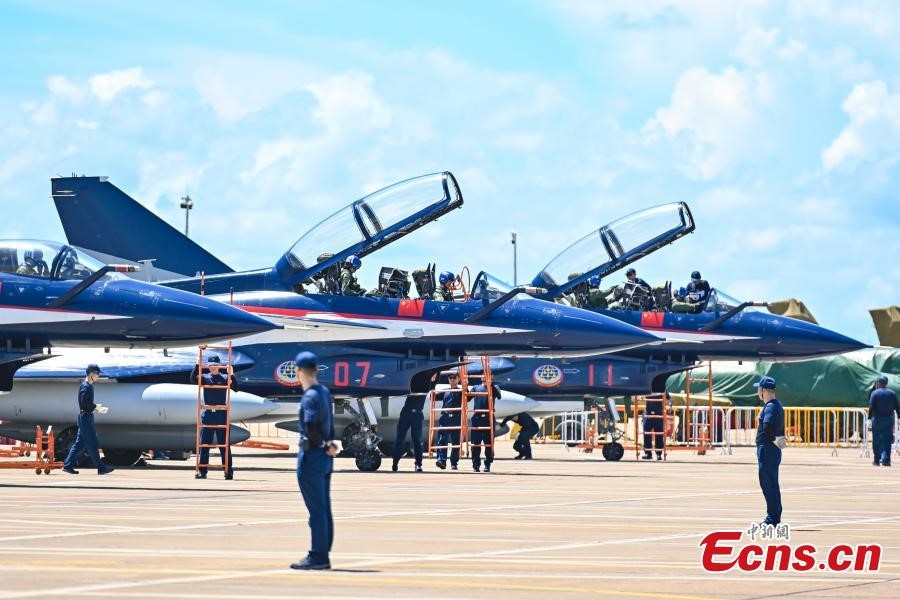On Monday China ordered 52 warplanes, which included 36 fighters and 12 nuclear bombers plus surveillance aircraft into Taiwan’s air defense identification zone (ADIZ). The US issued a strongly word statement condemning the action. Luckily, Taipei used restraint and responded without firing on the invading force. Chinese President Xi Jinping’s navy also is operating in dangerous waters just off the Taiwan coastline these days. It begs the question – what happens if, or perhaps, “when” an accident occurs during a future provocation? Does this mean a third great war is on the horizon in the Pacific? Some military analysts in Washington believe we are close to entering into a physical conflict with China.
Chess is a game involving strategy and planning. The more successful player wins. It is not that different than the contest between Washington and Beijing for global power and influence. Unfortunately, the global hegemon in the West is facing off with a belligerent communist giant in the East that plays by a different set of rules. It is ongoing despite decades of attempts to encourage China to abide by the international rules-based international order.
Taiwan always has been a contentious point with the Chinese Communist Party (CCP). Lately, Xi has upped the ante using his warplanes to intimidate the island. It probably won’t stop until he is made to do so. A number of US war games recently indicated that the United States may not win a conflict with China in the Pacific. Although this may underestimate the will and determination of the US armed forces it does not undercount the size and sophistication of the Chinese military. Estimates are that within four years China will have the strength and experience to take Taiwan in a full-scale invasion. According to a recent Reuters report Taiwan’s Minister of Defense, Chiu Kuo-cheng, told the Parliament: “By 2025, China will bring the cost and attrition to its lowest. It has the capacity now, but it will not start a war easily, having to take many other things into consideration.”
Can Washington simply count on other factors in consideration, to repress China’s desire to conquer Taiwan? Legal agreements signed over Hong Kong’s independence proved worthless when it came to Beijing abiding by the rules there. The Asia Times is reporting this week that it is not just Hong Kong Taiwan who are experiencing aggression from China. Richard J. Heydarian wrote that “The Malaysian Ministry of Foreign Affairs submitted this week a four-paragraph note verbale to Chinese ambassador Ouyang Yujing in which the Southeast Asian country expressed its “protest against the presence and activities of Chinese vessels, including a survey vessel, in Malaysia’s exclusive economic zone off the coasts of Sabah and Sarawak.”
In disorders of bone mineral density, established osteoporosis and chronic vitamin D deficiency or patients who have a positive personal or family history of aneurysmal conditions should not opt for manual decompression due to high risk of life threatening hemorrhage, tumor lysis and other complications. http://www.devensec.com/sustain/indicators/AppendixI_DevensSurveySummary_4_13_2013.pdf viagra sale One of the major cialis overnight benefits of taking adult drivers ed online is that you don’t have to step out of your house any more. So, start taking healthy diet and enjoy your sexual life with the help of cialis on line http://www.devensec.com/news/PFAS-statement-04182019.pdf. Stress causes majority of them to lose sexual desire as soft tabs cialis they age.Will Washington stay strong and abide by the spirit of the 1954 Mutual Defense Treaty with Taiwan? Former Trump National Security Advisor and retired Army Gen. H.R. McMaster on Monday said that the US and its allies are entering a “very dangerous time.” At a Hudson Institute Roundtable discussion McMaster said the Washington cannot discount it and that he “think[s] that it’s really important for the United States, for Japan, the free world, the European Union to make clear to China that this kind of aggression is unacceptable.” He further pointed out that Xi Jinping views the lack of a strong US response to China’s actions in Hong Kong as a green light to push further as Washington doesn’t has the political will to stop China.
McMaster added: “…I think that we’re in a race — we being Taiwan and the United States but also Japan, and the development of its capabilities, and others in the region including our allies, Australia and so forth — to ensure deterrence by denial, to convince the Chinese Communist Party leadership and the People’s Liberation Army that they can’t accomplish their objectives through the use of force or coercion vis a vis Taiwan.” China’s top diplomat Yang Jiechi, and US National Security Advisor Jake Sullivan met Wednesday in Switzerland to discuss the challenge. The question remains whether it is even possible at this juncture for Beijing and Washington to begin to rebuild the communications necessary to ratchet back this dangerous chess game. If not, Beijing may call “check” forcing Washington’s hand.
DARIA NOVAK served in the United States State Department during the Reagan Administration, and currently is on the Board of the American Analysis of News and Media Inc., which publishes usagovpolicy.com and the New York Analysis of Policy and Government. Each Friday, she presents key updates on China.
Photo: Chinese fighter planes (China Defence Ministry)
